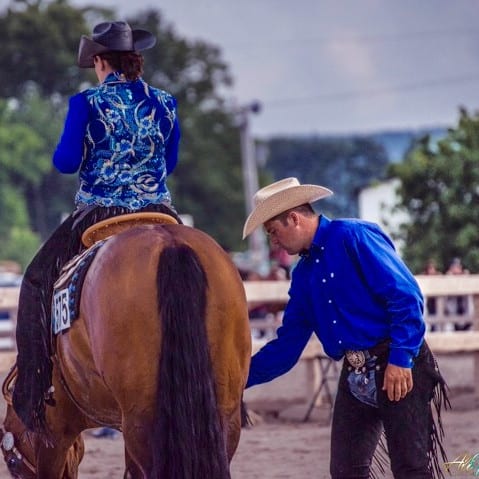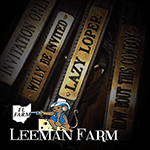We all have pet peeves in our respective lives. Teachers get irritated when students don’t show up with writing utensils or servers get annoyed when patrons forget to tip. But what if our small frustrations had potentially dangerous consequences?
When dealing with thousand-pound animals whose behavior and mentality can be unpredictable, horse trainers’ pet peeves are often more significant.
We spoke with some of the industry’s long-standing successful trainers about not only what irks them, but those habits and negligence they see that can often create perilous situations.
BE AWARE
David Busick of Livermore, California has trained multiple youths and amateurs to a variety of championships including the AQHA World and AQHYA World Shows as well as the All-American Quarter Horse Congress. A guru of the trail class, David has seen all sorts of negligence and absentmindedness by exhibitors that have potentially dangerous consequences.
“You have to keep your eyes up around the trail warm up pen,” Busick (pictured right) 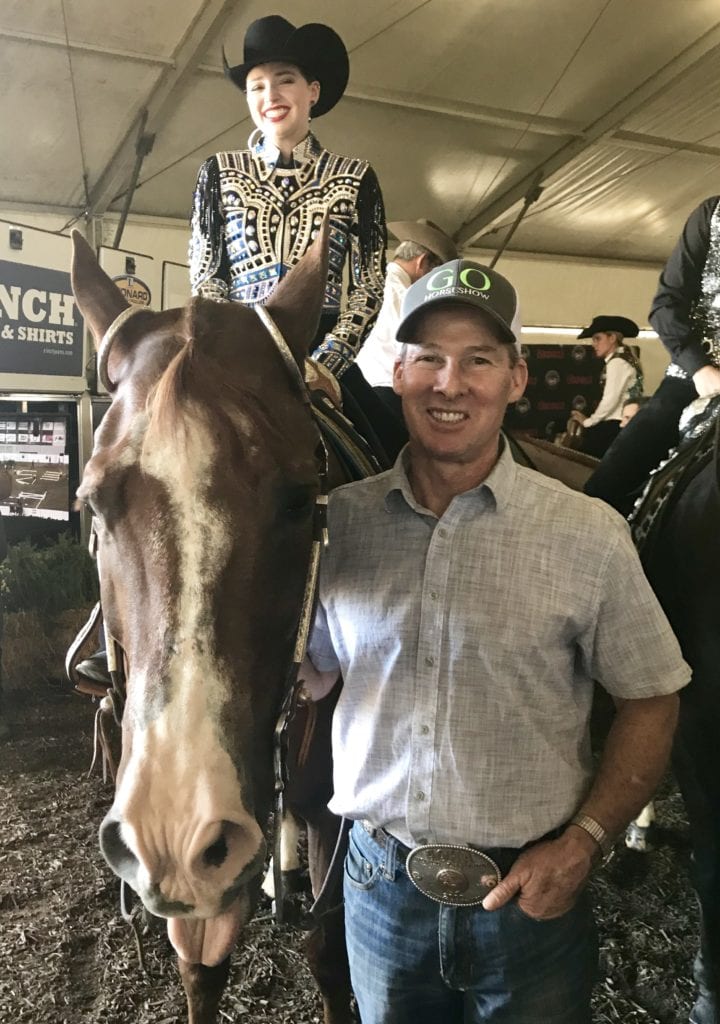 passionately exclaims.“It drives me crazy when I’m schooling over poles at a jog or lope and someone distractedly leads their horse out over the poles. I could be going one hundred miles an hour (he exaggerates) and have to slam to a stop with raised poles under my horse. It’s dangerous for the other person, and especially for the horse I am on.”
passionately exclaims.“It drives me crazy when I’m schooling over poles at a jog or lope and someone distractedly leads their horse out over the poles. I could be going one hundred miles an hour (he exaggerates) and have to slam to a stop with raised poles under my horse. It’s dangerous for the other person, and especially for the horse I am on.”
While trainers could give you an endless list of pet peeves, there are certain infractions by the careless or self-centered individual that can cause a calamity.
“On a small scale, I hate when people are unprepared; they don’t know their pattern or they are getting ready to show and realize they didn’t bring everything they need at the last minute. It is a necessity to plan,” David laughs goodheartedly. “On a more serious note, when people are not aware of their surroundings, it can be hazardous.”
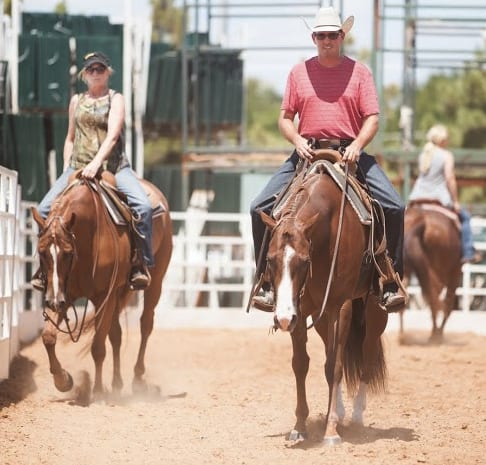 For example, Busick explains, “Whether leading or riding a horse by another and someone lets their horse flip their hip into you. This is bad behavior and could easily result in someone getting kicked. People need to be aware of their horse’s body position.”
For example, Busick explains, “Whether leading or riding a horse by another and someone lets their horse flip their hip into you. This is bad behavior and could easily result in someone getting kicked. People need to be aware of their horse’s body position.”
Passionate about the topic, Busick quickly flips to another example, “When someone stops out of the blue in a busy warm-up pen and practices a turn-around without awareness to who is around them.”
Trying to conclude the interview, Busick interjects just a few more irritants and laughs, “Oh, when people lead their saddled horse under cross ties without watching; or when people crowd around the in-gate and exhibitors are shuffling in to show. I could go on and on.”
PUT DOWN THE PHONE
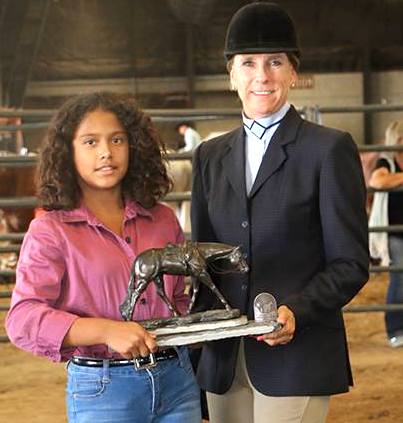 AQHA Professional Horsewoman of the Year, Leslie Lange (pictured right) chatted with us while returning with her mount to her stalls from the show pen in Las Vegas.
AQHA Professional Horsewoman of the Year, Leslie Lange (pictured right) chatted with us while returning with her mount to her stalls from the show pen in Las Vegas.
“Pet peeves, I have so many,” she laughs, “When students show up to practice and don’t have or know their pattern.”
Coming back from the warm up pen in Las Vegas, Leslie saw some potentially dangerous situations.
“A busy show like this (the Silver Dollar Circuit) has a crazy warm-up pen, and people walk right through it without regard for what is going on around them. Cell phones are the worst. People looking at their phones will walk out in front of you and not even realize they could have gotten in a wreck.”
SCARY SECONDS
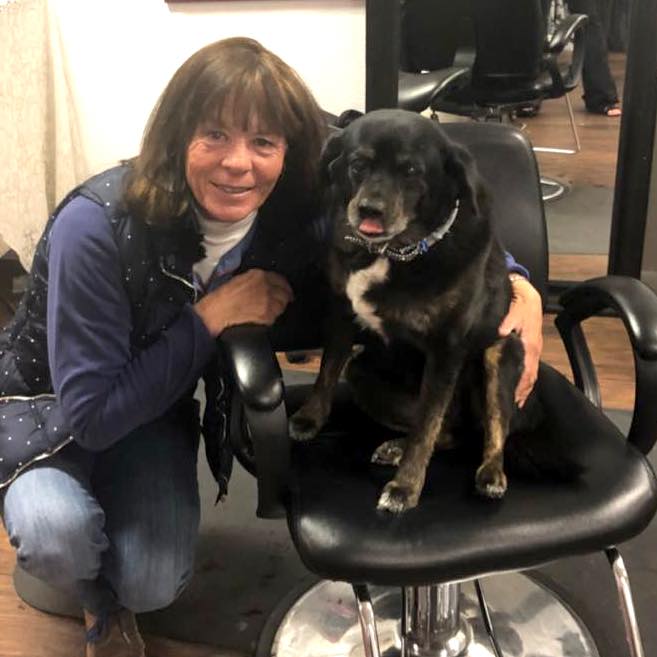 Hunter trainer and multiple Congress Champion, Linda Crothers was the inspiration for this article.
Hunter trainer and multiple Congress Champion, Linda Crothers was the inspiration for this article.
“Over the years I have seen so many preventable incidents. As trainers, we don’t want to see people or horses hurt, yet carelessness causes so many accidents.”
A scary incident for Crothers (pictured left) happened to her while at an AQHA show in Venice, Florida one year. “I watched a girl bring her horse to longe with a chain over its nose and a nasty, nylon longe-line completely tangled in knots,” she cringed. “After about ten minutes, she was still struggling. She was only about 13 years old. It would have only taken seconds for it to turn disastrous.”
With the best interest at heart, Crothers attempted to help the girl despite having to dismount to do so. “The worst of it was, she didn’t want to take instruction.” Crothers sighed with relief, “Nothing came of it. In spite of being high, the horse was able to stand still long enough to resolve the situation. No one was hurt.”
But the outcome could have been dangerously different. Crothers acknowledges, “We, as trainers, are partly at fault. We don’t teach horsemanship or horse husbandry skills anymore.”
About the Author: An AQHA Professional Horseman, Mo West, currently lives in Tracy, California. Formerly a high school English teacher for over 15 years, she now pursues her passion. As an assistant trainer at Busick Quarter Horses, she enjoys training, coaching, and showing in all-around events. She is an avid world traveler and loves boats and the water. Fishing is her second favorite activity, and she always has her beloved dog, Crash and her newest, four-legged family member, Boone at her side whenever possible.
Photos © Ali Grusha, GoHorseShow, NSBA


